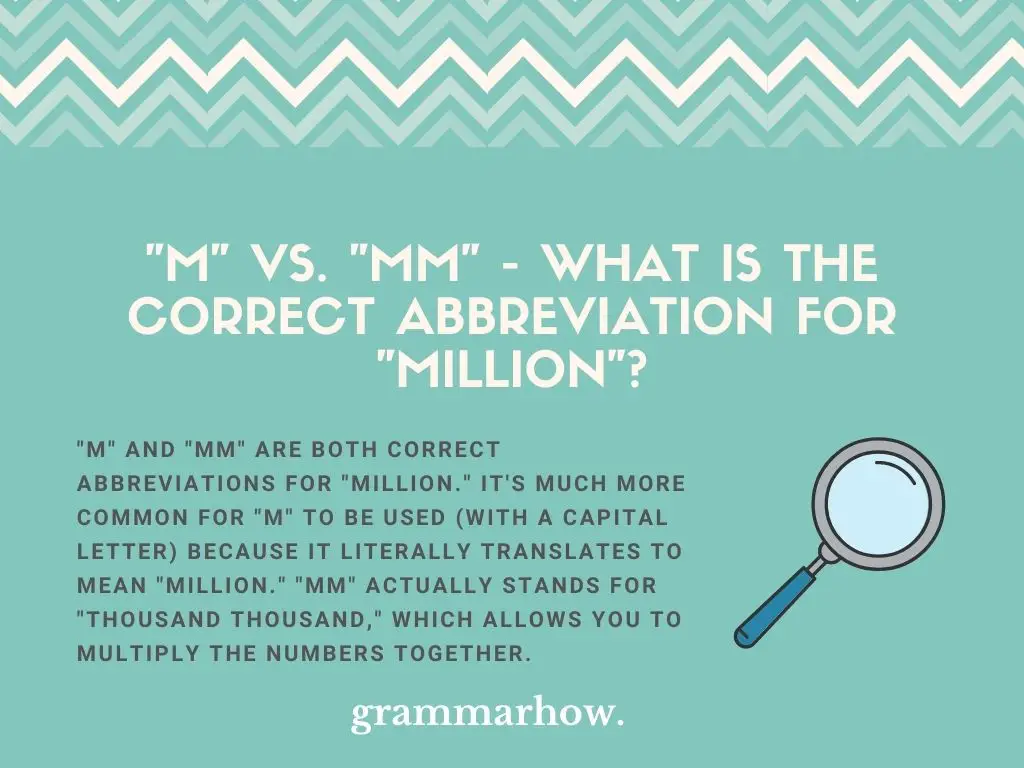
You might not put a lot of thought into your abbreviations, and that’s okay. However, there are official abbreviations out there that you might come across, and it would help to know about them. We’ll explain the correct abbreviation for “million” in this article.
“M” and “mm” are both correct abbreviations for “million.” It’s much more common for “M” to be used (with a capital letter) because it literally translates to mean “million.” “MM” actually stands for “thousand thousand,” which allows you to multiply the numbers together.

“M” is the official abbreviation used whenever a million units of something are requested.
“mm” (which is usually kept in the lower case) is an old-fashioned abbreviation that doesn’t see much common usage. You’ll find that it’s mainly used in the energy sector, but it otherwise doesn’t get recognized.
“mm” is correct because of the Latin term “Mille.” “Mille” means “thousand,” and we can use “mille mille” to mean “thousand thousand.”
On the surface of it, “thousand thousand” might not make much sense. However, it is possible to multiply the numbers together, which is all you would need to do when it comes to creating one million (i.e. 1,000 x 1,000 = 1,000,000).
“M” is the most common abbreviation for “million.” If you’re going to abbreviate “million,” it would usually turn into this form. It makes the most sense considering that “million” starts with the letter “M.” Most abbreviations follow this standard practice.
However, it’s fairly uncommon for “Million” to be abbreviated outside of scientific circles. Most native speakers wouldn’t care much about “million” as an abbreviation because they won’t often come across the number in their daily lives.
You might see it used like this:
“M” is only used as an abbreviation when talking about a lot of money or in scientific communities. Generally, you will not come across a “million” of anything.
“MM” is an old-fashioned abbreviation, but it still sees some usage today. You might come across “mm” in scientific or engineering fields, where different values are required, and they can reach well into the millions as a unit.
“mm” is often left uncapitalized (though there are no specific rules that state which way it should be written). It is Latin for multiplying one “thousand” by itself to create the “million” number.
The correct abbreviation for “million” in the UK is only M. “M” is the only acceptable abbreviation to use for “million” in UK English. You’ll find that a lot of UK native speakers won’t even know what “mm” stands for (outside of the “millimeter” measurement that is abbreviated to “mm”).
In the US, both M and mm are used as abbreviations for “million.” It’s up to the speaker which variation they’d like to use. It generally depends on the context, though, and you’ll find that M is still the most useful one whenever you’re abbreviation “million.”
Martin holds a Master’s degree in Finance and International Business. He has six years of experience in professional communication with clients, executives, and colleagues. Furthermore, he has teaching experience from Aarhus University. Martin has been featured as an expert in communication and teaching on Forbes and Shopify. Read more about Martin here.